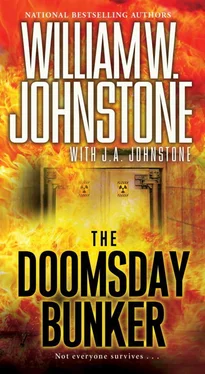That would have meant all the residents would be fleeing to the surface—and they didn’t know what dangers might be waiting for them up there.
Despite the fact that things seemed to be working again, he still wanted to know what had just happened. Like everything else in the Hercules Project, one man would have the answers: Graham Moultrie.
The Command Center was buzzing with excitement and activity when he got there, and the hubbub of conversation among the people on duty had an anxious note to it. Andrea Marshall spotted him and called, “Patrick! Do you know what just happened?”
“I was hoping somebody here could tell me,” Larkin said.
Andrea shook her head. “It took us all by surprise, too.”
“Graham in his office?”
“I think so…”
Larkin didn’t wait to hear more. He strode through the Command Center to Moultrie’s office and knocked on the door.
For a moment, there was no response. Then Larkin heard the electronic lock on the door buzz, and Moultrie called, “Come in.”
When Larkin entered the room, Moultrie nodded and went on, “I thought that might be you, Patrick. I recognized your knock.”
“Maybe it was a little heavy-handed—” Larkin began.
“Not at all. I also figured you’d be the first one to come see me.” Moultrie was sitting behind his big desk, surrounded by monitors, computer terminals, and other equipment. He leaned back in his chair and said, “You like to stay on top of everything that’s going on down here.”
“I don’t think I’ve been staying on top of it enough. Something’s going on, Graham. I was considering asking you about it anyway, but with everything that’s happened today, I have to.”
“The power going out, you mean?”
“And the riot that almost broke out in the Bullpen over the new food rationing.”
Moultrie sat forward, suddenly tense. “Riot?” he repeated. Clearly, he hadn’t heard about that yet.
“Don’t worry, it got broken up when the lights went out and everybody started panicking about suffocating instead. But once they get over being scared, they’ll be mad again about the food.”
Moultrie waved a hand dismissively and said, “They’ll get used to that. There’ll still be enough for everyone to survive.”
“Yeah, but I don’t think they signed up for a subsistence diet,” Larkin said. “At the moment, though, I’m more worried about the power and the life-support systems. It’s hotter down here than it used to be, Graham, and the air’s not as good. Plenty of people have noticed that, too, and I expect they’re not happy about it.”
Moultrie clasped his hands together on the desk in front of him and sighed. “It’s been that obvious?”
“It has.”
“I was hoping people would think… Well, I don’t know what I was hoping. That it wouldn’t come to this, I guess.”
“Come to what?” Larkin said. He couldn’t help but hear the hollow note of dread in his voice.
“The life-support systems are failing.”
Larkin stared at Moultrie for a long moment, then shook his head. “That can’t be. You worked everything out ahead of time.”
“I did the math,” Moultrie snapped. “All the experts I hired did the math. But this is uncharted territory, Patrick. Nobody ever tried to support this many people in a completely sealed environment for this long before.”
“It hasn’t been completely sealed the whole time,” Larkin pointed out.
“The breach from the surface was a short one. We’ve been monitoring for radiation and contaminants, and the levels are so low they’re well within the normal range. The breach elevated them so slightly that it might as well have not happened.”
Larkin couldn’t suppress the reaction he felt to that statement. He burst out, “Well, then, my God, why don’t we just go back up to the surface?”
“I said the range is normal down here.” Moultrie’s voice was hard and flat now, revealing that he didn’t like to be challenged, which Larkin already knew. “It’s still too high at the surface.”
“It wasn’t too high for Ruskin and the others to survive.”
“You saw them, Patrick. You know what they were like. Is that the sort of existence you want to condemn our people to?”
“Of course not. But we don’t know why those people were in such bad shape. The worst of them could have been poisoned by the radiation from the blast itself, not the residual radiation. We know that Ruskin was somewhere around here when the bomb went off. He must have been down in a storm cellar or something like that to have made it through. And he was in better shape than some of the others.” Larkin cast his memory back. “What about Earl Crandall? He didn’t seem sick. He could have come here from somewhere else, somewhere where things aren’t as bad.”
“And your point is?” Moultrie asked.
“If Crandall could come here and still be all right, it stands to reason we could leave the project and head west, to where the damage and the radiation aren’t as bad. Sure, the infrastructure will be heavily damaged and the technology will be gone, but we’d learn new ways of doing things. A lot of us have the necessary survival skills, and we can teach and help the ones who don’t.”
That was the most the normally laconic Larkin had spoken at one time in quite a while. He could tell from the stony look on Moultrie’s face, though, that the argument hadn’t done any good.
“When the time comes, that’s what we’ll do,” Moultrie said. “But it’s not that time yet.”
“Then when? When the generators and the life-support systems fail entirely?”
“They’re not going to—” Moultrie broke off and slapped a palm down on the desk in obvious frustration and anger. “Damn it!”
“They are failing, aren’t they? Not just the life-support systems, but the generators, too.”
Moultrie looked away, unable to meet Larkin’s eyes for a few seconds. Then he said, “Again, no one has ever undertaken anything like this before. The wear and tear on the equipment has been more than we anticipated. We’ve been having to shut down some of the generators for a while each day, and when we do that, we have to take some of the life-support systems off-line as well, so as not to put too much of a strain on the other generators. We’re doing that on a rotating basis, so nothing is down for too long at a time.”
“Like the old rolling brownouts we used to hear about,” Larkin said.
“Exactly. But there’s a solution.”
“What’s that?”
“We need generator parts to replace the ones that are wearing out. Honestly, best-case scenario, we could use some more gas to power them, too. If we can keep the generators running, we can patch up the life-support systems enough to get by.”
Larkin had to stare again. “There’s not enough gasoline?”
“Blast it, Patrick, you know as well as I do that not everything was completely in place when all hell broke loose. If I’d just had another month to prepare, even two more weeks…” Moultrie sighed and shook his head. “We had enough of everything on hand to survive in relative comfort for almost a year, didn’t we? And it’s not like everything is going to run out tomorrow.”
“But it’s going to get a little more dicey the longer we stay down here.”
Larkin’s words weren’t really a question, but Moultrie shrugged in eloquent response anyway.
“All the more reason to risk moving back to the surface—”
“No! I won’t abandon the project until I’m absolutely certain that it’s completely safe.”
“Nothing in life is completely safe, Graham,” Larkin said quietly.
“Maybe not, but I won’t do less than my absolute best to protect my people.”
Читать дальше









